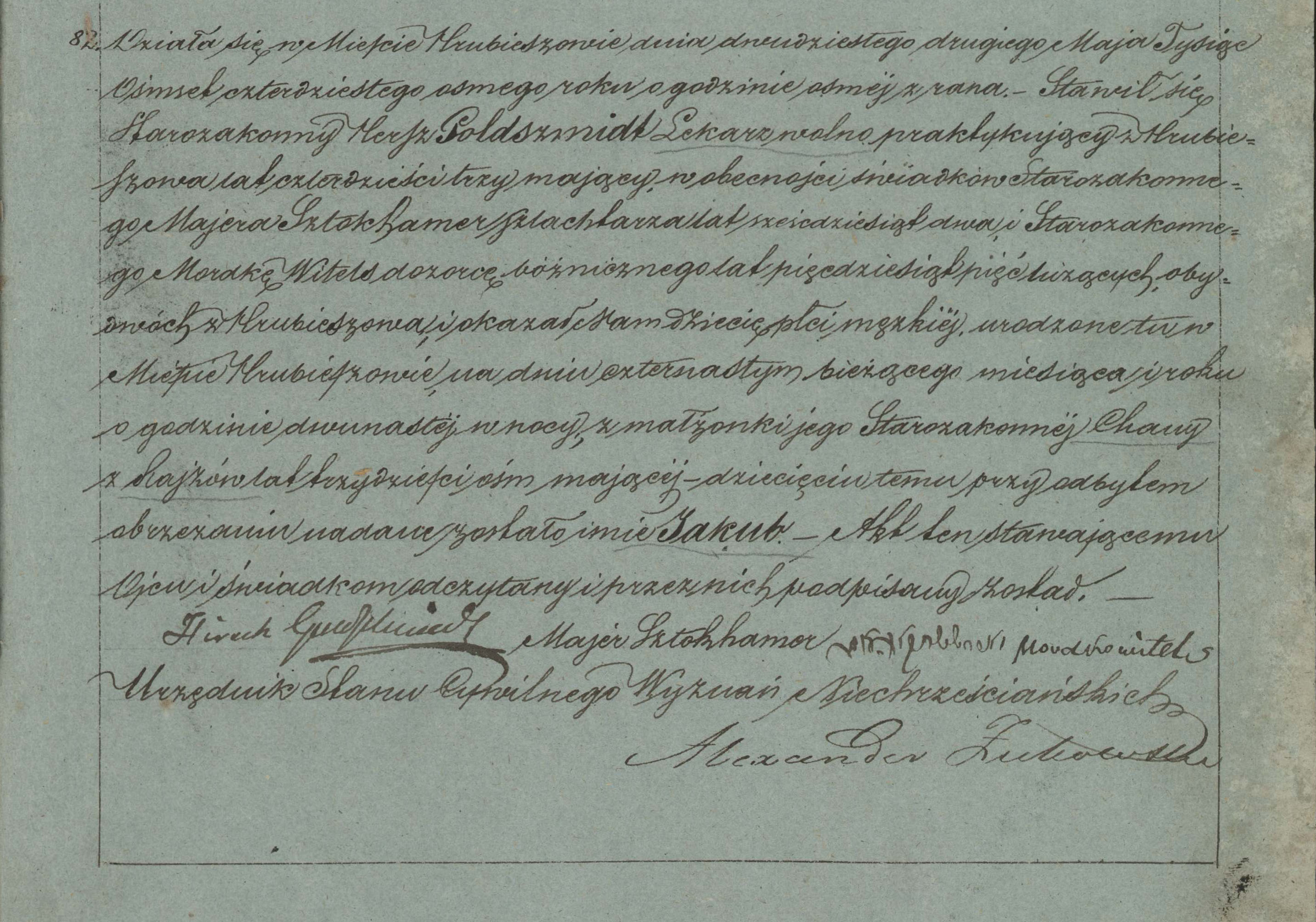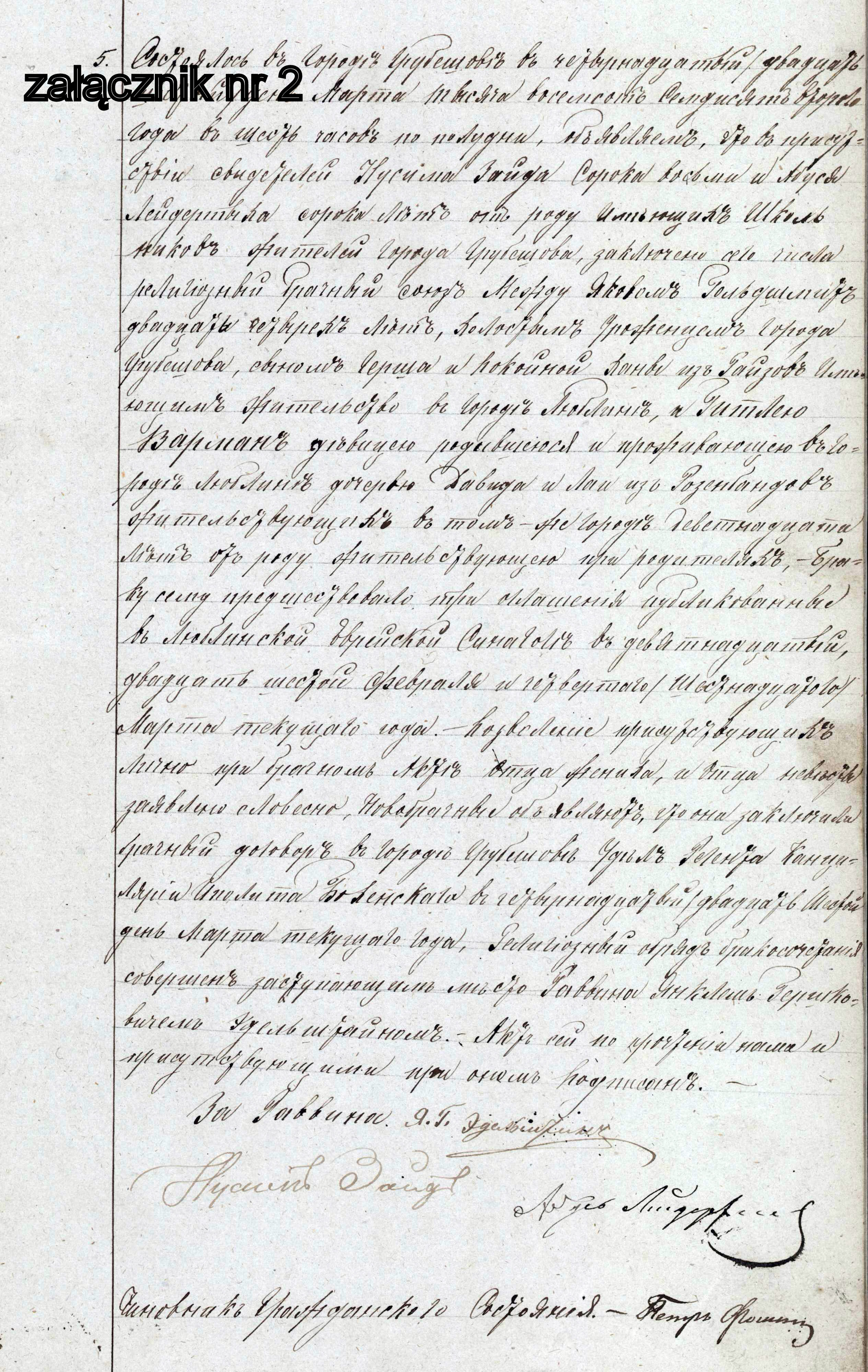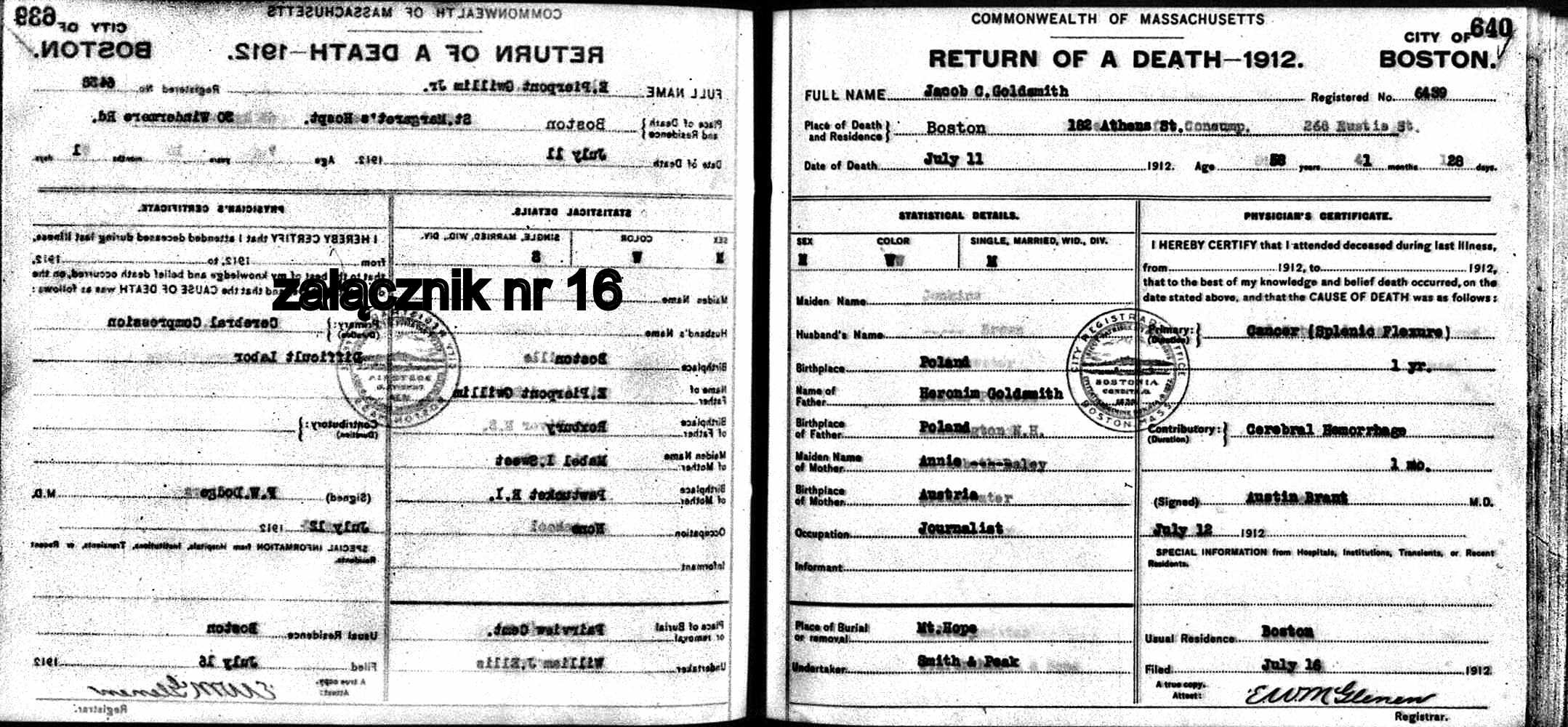Jakub Goldszmit
Henryk Goldszmit’s paternal uncle
A lawyer, writer, journalist, the son of Hersz Goldszmit and Chana neé Rajs, born on 14 May 1848 in Hrubieszów; died on 11 July 1912 in Boston.
He probably attended elementary school in Hrubieszów, and then continued his education in the Lublin gymnasium a seven-grade secondary school, which from January 1862 to May 1865 functioned as lyceum, an eight-grade secondary school. At that time, he lived in the lodgings in Lublin. During his school years, he made friends with Aleksander Głowacki (Bolesław Prus), Aleksander Świętochowski, and Julian Ochorowicz who would become influential writers and advocates of positivism. In 1863, he made his writing debut by publishing a letter from Hrubieszów in the Warsaw-based weekly for Polish Jews, Jutrzenka, concerning the local construction of a new synagogue. He passed his graduation exams most probably in 1866. Then, he began publishing correspondence from Lublin in Izraelita as well as book reviews and small articles in Kurier Lubelski. In 1867, he sent book reviews and surveys of foreign affairs to Przegląd Tygodniowy. He, as well as his father, belonged to the “society bank supporting impoverished doctors, widows, and orphans of the doctors.” In the years 1868–69, he lived in Warsaw, possibly studying at the preparatory course for the candidates for law studies. During this time, he still cooperated with Kurier Lubelski and Izraelita. In the 1870s, in Warsaw, Jakub Goldszmit published a volume entitled Z życia żydowskiego. Obrazki i szkice (Jewish Life: Images and Sketches), which was dedicated to his sister, Magdalena Rajner née Goldszmit. He also published a pamphlet, entitled Słówko o ważności Stowarzyszenia wzajemnej pomocy subiektów wyznania mojżeszowego w Warszawie (A Word on the Significance of the Warsaw Society of Mutual Help for the Jewish Shop Assistants).
Probably in the autumn of 1870, Jakub started his law studies at the Faculty of Law, St. Petersburg Imperial University. After less than two years, he temporarily dropped his studies to marry nineteen-year-old Gitla Warman, “born and living in Lublin, the daughter of Dawid Wahrman and Łaja neé Rozenband.” The religious ceremony took place on 26 March 1872 in Hrubieszów. It seems that Jakub remained in the country at least until the end of the following year since on 20 January 1873, “as a father and a student of law at St. Petersburg Imperial University, he officially presented and registered, in the presence of witnesses, a female infant, born on 25 December of the previous year [1872]/6 January [1873, Old Style], who was given the name of Anna Henryka.” He graduated in 1875, and in the autumn of this year, he became engaged in establishing an evening school in Lublin. During its one-term life, until February 1876, he conducted lectures in “social sciences and the life stories of distinguished people.” At this time, his daughter was already ill, and she was undergoing treatment in a health resort near Włocławek. In August of the same year, Gazeta Lubelska (No. 102) published a note reporting that Jakób Goldszmit, “an appointed attorney at the Lublin court of peace, undertakes to serve as a defence attorney in civil and criminal cases not only in Lublin but also in the provinces.” Simultaneously, he continued his work as a journalist, contributing to Kurier Lubelski (1876–77, 1880–81) and its successor, Gazeta Lubelska (1876–78), as well as to Izraelita (on and off, until 1881). In 1877, he was also a regular correspondent for the Warsaw-based Echo, and he published articles on legal topics in Gazeta Sądowa Warszawska (1878–79).
It is known that Jakub lived in several locations in Lublin: at 201 Królewska Street (in 1876), 393 Kowalska Street (in 1877), and on Lubartowska Street (in 1878). In the years 1879–81, according to the census, he returned to 393 Kowalska Street; we know, however, that at the end of 1880, Jakub lived in Warsaw. On 23 December 1880, he wrote a letter to Józef Ignacy Kraszewski, and the return address was “Warszawa, Piękna 23”; the letter was signed “Jakub Goldszmit, a lawyer.” In June 1881, he wrote to the novelist Eliza Orzeszkowa, “As a result of certain family issue, I have quit the legal profession and within six months came to Warsaw, where I devoted myself to work as a journalist.” He decided to publish almanacs since they have “the advantage over periodicals in that they are more successful in strengthening in the reader’s mind and thought through the information that they present” (Kujawianin 1883). And so, “the desire to serve the cause of mutual rapport and closer acquaintance among the inhabitants of the same land” brought into existence Kalendarz dla Izraelitów na rok religijny (zwyczajny) od stworzenia świata 5642, czyli od narodzenia Chrystusa 1881-1882 (The Hebrew Almanac for Israelites for the Year 5462 from the Creation of the World, which is the Year AD 1881–1882). He simultaneously published Kalendarz domowo-gospodarski (Home and Farm Almanac) (1882–85), Warszawianina. Kalendarz familijny (Varsovian’s Family Almanac) (1882–85), and later Noworocznik Warszawski (Warsaw Almanac) (1883), as well as Rolnik (The Farmer’s Almanac) (1885). Apart from the articles concerning current topics, Jakub also published translations, mainly from German; he could also speak Hebrew, Russian, French, and English.
In 1883, Jakub’s daughter died, and he fell seriously ill. In his letters to Orzeszkowa and Kraszewski, he wrote that he had lost the three closest people at that time (“the dearest child,” “the best wife,” “the beloved sister”). The documentary research, however, has not confirmed this statement, instead saying that both the wife and the sister died much later. At the beginning of 1884, he returned from his therapy and became engaged in the creation of the Society for Nursing the Ill in Private Houses in Warsaw (Stowarzyszenie pielęgnowania chorych po domach prywatnych w Warszawie; also known as Towarzystwo opieki nad chorymi w Warszawie [the Society for Nursing the Ill in Warsaw]).
The information concerning the further life of Jakub Goldszmit comes from his letters to Orzeszkowa. Thanks to the letters, we learn that in May 1885, he stayed in Sandomierz “in order to recover from severe illness,” and he spent the next summer in the village of Radzymin.
In 1887, he was arrested by tsarist authorities due to “disobedience,” and then, as a political emigrant, he found himself in Budapest. Then he left for the United States of America, where he continued his work as a journalist. In 1891, he published biographies of distinguished Poles in the American press. According to the bibliographical sources, he was the editor of a few Polish literary periodicals published in New York: in 1892 Orzeł Biały (a weekly), Biały Husarz (only a few issues were published), and from 1894 to 1905 Przegląd Międzynarodowy (a monthly). In 1894, he lived in Philadelphia shown a letter dated May 1894 and signed by “Dr Goldszmit.” In February 1909, he wrote from Boston, as “Professor Jakob C. Goldszmit, Doctor of Philosophy and Medicine.”
On 31 January 1910, Jakub married 37-year-old Eugenia Bodzyńska (in the marriage records Jakub is mentioned as a widower). The couple lived at 325 Broadway, and Eugenia took care of the house.
Two years later, on 11 July 1912, Jakob C. Goldsmith died of cancer. According to his death certificate, he was buried in the Mount Hope Cemetery in Boston.






